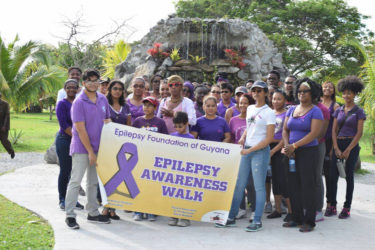The Epilepsy Foundation of Guyana (EFG) on Monday hosted a discussion with several stakeholders to enlist their help to raise awareness about the illness and available treatment.
The discussion coincided with the observance of International Epilepsy Day, under the theme ‘Putting Epilepsy in the Picture.’

Head of the EFG Thomas Singh told Stabroek News on Monday that the meeting was intended to gather all the relevant stakeholder agencies that are in constant contact with persons who are epileptic, so that they can find a way to work together to make it easier for them.
“So, we have invited people from a number of agencies including the Georgetown Public Hospital, the Pharmacy Association, and several inter-faith persons so we can have discussions on stuff like the services that are being offered, the access to medication and other related aspects,” Singh said, while noting that the Foundation’s mission is to ensure that epileptics can get affordable, high quality care to treat the illness.
He said there is a need for a conversation among the stakeholders about issues such as the reliable, sustainable supply of good medication and ways they can tackle the ongoing stigma of the illness that drastically affects the patients.
“Another worrying thing about epilepsy is that a large portion of persons think it has to do with demonic possession and spirits and those are some of the things we will be talking about. That is why we have invited relevant persons from the religious fraternity,” he explained, while stating that another aim of the discussion was to “let everyone know who we are and how we could contribute to managing and treating epilepsy in Guyana.”
Asked about the organisation’s successes since its formation in 2014, Singh said it has made significant progress. “We’ve made significant progress even though it has been about particular individuals. Individuals, who were previously unmanageable. They were not working and they had no hope of working,” he noted.
He explained that since 2014, the foundation has been able to work closely with over a dozen persons who were previously listed as unmanageable and has been able to assist them in managing their attacks.
“Beyond the patients, we have worked with nurses and doctors so the scope of our reach has been significant in treating the illness and raising awareness about it,” he noted.
With respect to the stigma that currently surrounds the illness, Singh explained that the foundation will be rolling out a plan to raise awareness in schools and workplaces with the aim of correcting the way people interpret the disease and its symptoms. “We visited a school last year and we will visit more this year and work places. It’s one of our major objectives, to build public awareness on the many issues surrounding epilepsy,” he explained.
When it comes to tackling the stigma, Singh related that the illness needs to be seen as a disability, as it is in many countries.
“It’s not highly prevalent [epilepsy] but the trouble about it is that if people experience an illness due just to simple to a fact of life, a head injury or birth problems, then they can live their entire life with their life prospects diminished because they’ve got this thing, which by all means is manageable, but they don’t know and we are compromising people’s human rights and dignity. And you know it is actually regarded as a disability in other parts of the world and that is something we want to promote,” he explained.
He added that the foundation has dealt with cases where children were removed from schools because of seizures, which he indicated was “horrendous” since they are being denied an education and a livelihood because of something that is “manageable and treatable.”
“It’s not the prevalence itself but the horrendous impact it can have on an individual’s life,” he pointed out, while stating that the increase in awareness and advocacy across the country will help to shape how people perceive the illness, including persons who suffer from it.








